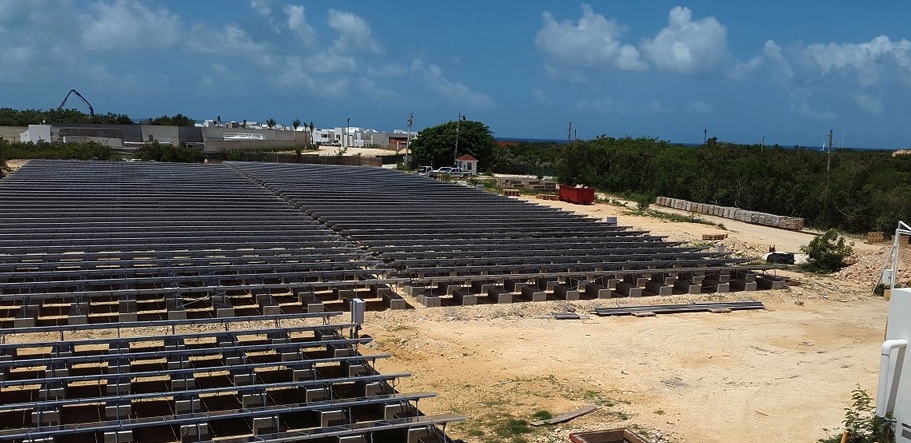Strapped with both water and energy crises, several island nations are investing in solar-powered water plants to attain more resilient water and power sources, according to executives of a major international resort chain.
One of the latest examples is the CuisinArt Golf Resort & Spa’s new installation in Anguilla, an island in the British West Indies east of Puerto Rico. The innovative solar generation system powers the resort’s reverse-osmosis water plant, and it is seen as a model for similarly situated Caribbean islands and hospitality operators.
Working with GE and Inovateus Solar, a South Bend, Ind.-based photovoltaic system developer, CuisinArt, installed its own 1.0-MW solar power generation plant with a battery backup system to store energy. In this way, says Rory Purcell, the resort’s chief engineer, the off-grid plant will provide an uninterruptible energy supply for the reverse-osmosis (RO) water treatment system.
The RO plant filters and desalinates supply water, creating potable “solar water” to the residents on the island, guests of the resort and irrigation water for the golf course, says Purcell.
The project—designed and constructed by CuisinArt and Inovateus with the contractors SwitchLogix and PDE Total Energy Solutions—has been designed in such a way that it is completely isolated from the grid. It also has the unique benefit of being able to reconnect partial loads, in a discretionary way, to continue to desalinate outside solar production hours. For those hours when the sun is down, it depends on the local utility, Anguilla Electricity Company Ltd.
Anguilla recently joined the group Carbon War Room’s Ten-Island Challenge to reduce the Caribbean’s carbon footprint, and the CuisinArt plant is the first major foray into renewables for the island. The new solar plant saves 1.2 million pounds of carbon dioxide emissions annually, says Inovateus executive Peter Rienks. “The payback on this project will immediately save CuisinArt hundreds of thousands of dollars per year. Even more important, it provides a solution to the global water crisis,” he explains. “This system could be duplicated on any island in any country around the world.”
According to CuisinArt’s Purcell, the initiative is both viable and secure. “It is a proven strategy to penetrate the national demand with renewable energy far in excess of the usual grid-tied limits,” he says. PV is a low “environmental impact source, designed to withstand Category 5 hurricanes, low-flying objects and poorly directed golf balls,” he chuckles. “It has low maintenance requirements with a life expectancy in excess of 25 years.”
The new solar array supports the plant’s daily capacity of 1.25 million gallons of fresh water, which serves the 130-key resort and its Greg Norman Signature Golf Course, as well as the new 80-key Reef Hotel, an associated spa and six full-service restaurants. CuisinArt also operates hydroponic and organic farms, a 500,000-square-foot residential estate, and -- of course -- an extensive irrigation system.
“CuisinArt has set a sustainable precedent for photovoltaic water purification throughout the world,” says Peter Foss an executive with GE. “Not only will the project have a great return on investment, it will also help reduce the island’s dependence on fossil fuels and help create a cleaner environment for generations to come.”
Related Stories
| Aug 11, 2010
AIA Course: Building with concrete – Design and construction techniques
Concrete maintains a special reputation for strength, durability, flexibility, and sustainability. These associations and a host of other factors have made it one of the most widely used building materials globally in just one century. Take this free AIA/CES course from Building Design+Construction and earn 1.0 AIA learning unit.







